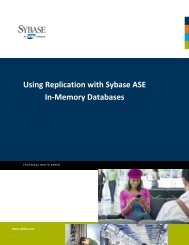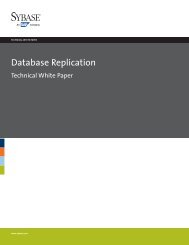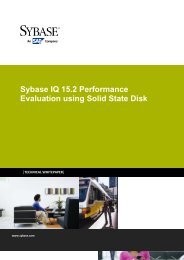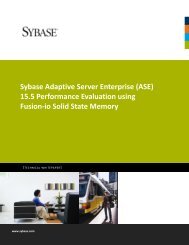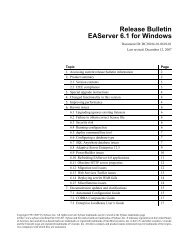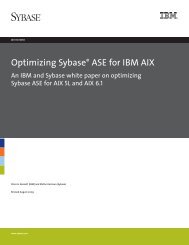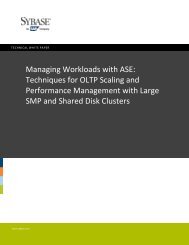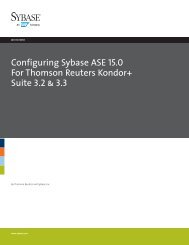A Practical Hardware Sizing Guide for Sybase IQ
A Practical Hardware Sizing Guide for Sybase IQ
A Practical Hardware Sizing Guide for Sybase IQ
Create successful ePaper yourself
Turn your PDF publications into a flip-book with our unique Google optimized e-Paper software.
Threads<br />
Startup Thread Allocation<br />
The default number of threads allocated in <strong>IQ</strong> during startup depends on two things only: the<br />
number of CPU cores and the number of user connections (-gm startup parameter). The<br />
total number of threads <strong>IQ</strong> allocates at startup can also be overridden by using the -iqmt<br />
startup option.<br />
By default, -iqmt is set to:<br />
60*(min(numCores,4)) + 50*(numCores - 4) + 2*(numConnections + 2) + 1<br />
On a 4 core system with -gm (numConnections) set to 20, that would be:<br />
iqmt = 60 * (4) + 50 * (4-4) + 2 * (20+2) + 1<br />
iqmt = 285<br />
On a 12 core system with -gm (numConnections) set to 50, that would be:<br />
iqmt = 60 * (4) + 50 * (12-4) + 2 * (50+2) + 1<br />
iqmt = 745<br />
There are two distinct types of threads: connection threads and server threads. They do not<br />
<strong>for</strong>m one big pool <strong>for</strong> all uses.<br />
Connection threads come from the part of the default calculation based on number of<br />
connections the server is configured <strong>for</strong>: 2*(numConnections + 2). These are reserved <strong>for</strong><br />
connections and will not be used as workers <strong>for</strong> query or load processing.<br />
This behavior can be observed by using the <strong>IQ</strong> Buffer Cache Monitor with the -threads or -<br />
debug option. When "Free Threads" equals "Reserved Threads" all that are left are those<br />
kept back <strong>for</strong> connection use with no threads left over <strong>for</strong> parallel operations.<br />
Server threads come from the part of the default calculation based on the number of CPU<br />
cores: 60*(min(numCores,4)) + 50*(numCores - 4). These threads are used in support of<br />
parallel loads or parallel query operations as well as those used <strong>for</strong> disk I/O. You must have<br />
free server threads to per<strong>for</strong>m operations in parallel.<br />
When you specify a value <strong>for</strong> -iqmt, it is imperative that -iqmt be larger than the default<br />
number of threads. If a value lower than the default is specified, <strong>IQ</strong> will ignore it and start the<br />
server with “minimum threads” which provides ONLY the connection threads. Set -iqmt no<br />
lower than the default calculation as previously described. This allows <strong>IQ</strong> to keep a pool of<br />
threads <strong>for</strong> query and load work as well as <strong>for</strong> connections.<br />
There is an upper limit of 4096 threads <strong>for</strong> a 64-bit system. The total number of threads<br />
represented by -iqmt plus startup parameter -gn must not exceed this number. The value of<br />
–gn defaults to –gm + 5 where -gn is the number of threads used by the SQL Anywhere<br />
engine.<br />
Disk I/O Threads<br />
There are two teams of threads that per<strong>for</strong>m disk I/O: sweeper and prefetchers. The sweepers<br />
write out dirty buffers and prefetchers read in buffers.<br />
The number of threads <strong>for</strong> each team is controlled by the following options:<br />
SWEEPER_THREADS_PERCENT<br />
Final<br />
37






